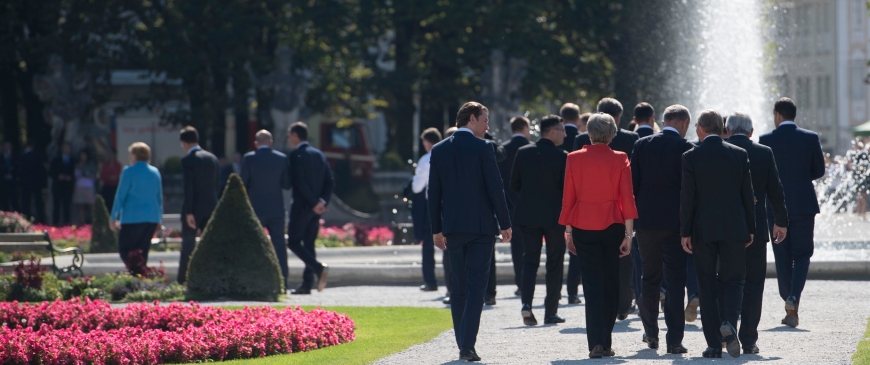
Remainers shouldn't assume EU leaders will welcome another Brexit referendum
Prime Minister Theresa May has yet again ruled out a new EU referendum. There has already been a people’s vote, and the people voted to leave, she told her party conference last week. But supporters of a fresh vote argue that this is not about "re-fighting" the 2016 plebiscite.
They say that voters should have another say once the terms of the Brexit deal are clear, especially as any deal will require sacrifices not mentioned in the campaign. Domestic debate aside, there are practical and political reasons why the EU-27 may be reluctant to bend over backwards to facilitate a fresh referendum.
The main practical problem is that the UK has almost certainly run out of time to hold another EU referendum before it is scheduled to leave the bloc on March 29, 2019. That means the EU would need to extend the deadline for the two-year Article 50 process for leaving the Union, a move that requires unanimous approval from member-states.
It is likely to take at least six months to stage a new referendum – including legislating for the plebiscite, agreeing the question, preparing for polling day and allowing sufficient time for the campaign to take place, experts say.
And, the earliest parliamentarians could potentially consider pushing for a referendum would be when they debate May’s Brexit deal or after the talks have collapsed altogether. The glacial pace of progress on issues such as the Irish border suggests that a deal probably won’t be presented to parliament until December.
The debate about whether to hold a new referendum has grown in recent months along with fears of a no-deal exit, and there are solid arguments on both sides. There is good reason for allowing voters to compare the final outcome of the Brexit negotiations with what they were promised during the referendum campaign. Equally, there is weight to Theresa May’s argument that the nation has made its choice and that it’s time for the government to deliver. Turnout at the 2016 referendum was high, and included 5.7 million people who had not voted in the previous general election. Another referendum could renew feelings of public disempowerment and trigger a backlash.
If there was, however, a genuine change of heart in London on a fresh vote, it is likely that the EU would not have a problem extending the Article 50 deadline by, say, one month. But a longer extension would be difficult.
The member-states and the EU institutions want the UK out before the European Parliament elections in late May 2019 and the nomination of a new Commission afterwards, or Britain would be obliged to take part. The EU has already agreed to redistribute 27 of Britain’s 73 seats in the European Parliament to other member-states. France – one of the hardliners in the Brexit talks – is among the countries that are due to benefit from this redistribution. It is hard to imagine that Paris will be eager to give the UK more leeway.
On the margins of the Salzburg summit, the Maltese prime minister suggested that most EU leaders would welcome another referendum. But no other leader, apart from the Czech prime minister, made similar noises in Austria.
Like Theresa May, EU leaders and, in particular, institutions are wary of being seen to contradict the democratic will of the people. EU national governments have already faced criticism for repeating referendums on EU matters until the public gives the answer the elites wanted to hear in the first place. Any overt effort by European leaders to help rerun the 2016 referendum could play into the hands of populist, eurosceptic and anti-establishment parties across Europe who argue that the bloc doesn’t listen to voters. Another EU referendum in Britain would also give the EU’s critics across the continent a shared cause to rally behind. Losing one referendum was bad enough; losing a second would be a severe blow.
It’s possible that if EU leaders had a very good reason to extend Article 50, they would find a way around the ‘parliamentary problem’. After all, when it comes to tackling seemingly intractable issues, the EU is famously good at pulling a rabbit out of the hat. But when asked behind closed doors whether they seriously entertain this scenario, officials hint that they have not been asked to look into this issue. They may be bluffing for fear of leaks which could antagonise the British government or fuel populist resentment.
But another explanation is also possible. Brexit is seen across the continent as a distraction from other pressing challenges, such as the migration crisis. EU leaders may be reluctant to ask their officials to work extra hours on a scenario which does not even have the backing of the British government.
That is not to say the EU would not, eventually, accommodate a fresh UK referendum. But those pushing for one should be aware that the EU’s side of the equation is not at all straightforward.
Agata Gostyńska-Jakubowska is a senior research fellow and Beth Oppenheim is a researcher at the Centre for European Reform.
